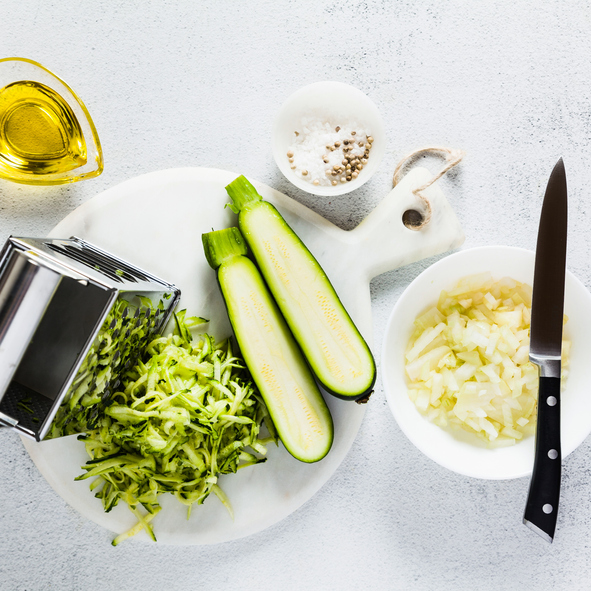Zucchini - Summers most versatile vegetable
/Zucchini - Summers most versatile vegetable
Talk about a vegetable that just keeps on giving all summer. If any of you are gardeners and grow zucchini, you know what I mean. Summer is the season for zucchini and this summer squash is proliferating by leaps and bounds in many backyard gardens. Whether you plant zucchini as a seed or from a seedling, it eventually morphs into a sprawling plant with giant dark green leaves and a never ending supply of cylindrical-shaped produce.
Zucchini’s history
Zucchini falls under the umbrella of summer squash meaning the fruits have soft, edible skin and are plants harvested before their rinds harden like butternut or acorn squash. Botanically zucchini is a fruit as it actually is an immature fruit that is the swollen ovary of the zucchini flower – a fun food fact you can impress your friends with.
The word zucchini comes from the Italian word “zucca” meaning squash. Even though zucchini did not originate in Italy, the Italian name has been used as some historians believe Italians developed this food. In other parts of Europe, zucchini are known as “courgettes” and in Britian as “vegetable marrow.”
Like all squashes, zucchini originated in the Americas. Archaeologists have found evidence of zucchini in Mexico dating back to as early as 7000 B.C. It was common for the people of Central America to consume a diet rich in corn, beans, and squash, today knows as “the three sisters.”
Health benefits
· Super low in calories
Looking for a low-calorie food? Look no further as zucchini fits the bill. Like many fruits and vegetables, zucchini has a high water content (95%) and provides about 27 calories in one cup. That’s about 40 to 50 percent lower than the same serving size for other low-cal green veggies like broccoli and Brussels sprouts. Zucchini also has no fat or cholesterol.
· High in potassium
In just one cup of this summer squash, it provides a whopping 455 milligrams of the mineral potassium, almost 10 percent of your recommended daily value. According to the American Heart Association, potassium can help control blood pressure as it lowers the harmful effects of sodium in your body. Studies suggest boosting your potassium intake while reducing sodium decreases the risk of a stroke or heart attack.
· Rich in vitamin A
One cup of zucchini provides an outstanding amount of vitamin A of 2011 International Units or 40 percent of our daily needs. Vitamin A is important for normal vision, maintaining a healthy immune system and for reproduction. It also helps the heart, lungs, kidneys and other organs work properly.
· Good source of magnesium
Magnesium is a mineral in which one cup of zucchini provides 40 milligrams or 10 percent of our daily needs. When our magnesium intake is optimal it can improve bone health, lower risk of hypertension and atherosclerosis, lowers coronary artery calcification, improves insulin sensitivity, and is involved with neuromuscular transmission and activity, and muscle relaxation.
· Good source of fiber
Zucchini contains about 3 grams of fiber per cup making it a good source of this necessary nutrient. Dietary fiber is important for bowel regularity, controlling blood glucose and lowering cholesterol. Our daily fiber needs range from 38 grams each day for men and 25 grams a day for women. Considering the average American only consumes about 14 grams each day, consuming zucchini with the skin and seeds intact, is a great way to get in your fiber needs.
Outstanding versatility
The versatility of zucchini is almost endless. Due to its very mild flavor and with a 95 percent water composition, zucchini is valued for its moistness in various recipes without compromising the taste.
It can be steamed, stir-fried, boiled, grilled, or baked. If you want to sneak in this healthy green veggie, go right ahead. It softens, moistens and improves the taste of breads, cake, cookies, pancakes, salads, soups, and even as a topping on pizza.
Whether you buy zucchini from the grocery store, farmer’s market or fresh from the garden, store in the refrigerator loosely wrapped in a plastic bag, using within 2 weeks.

